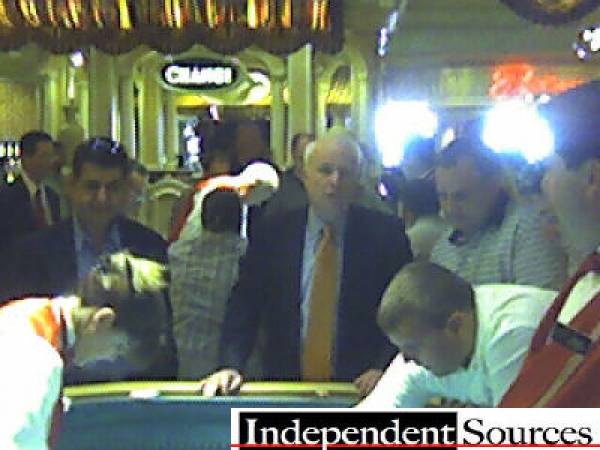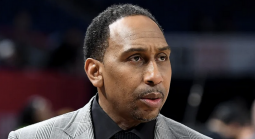John McCain’s Gambling Problem: Team May Have Ties to Gambling Industry

As the online gambling industry fights to gain its legal stature in the United States through a challenge waged by the The Interactive Media Entertainment & Gaming Association, the New York Times has hit the stands with a story that McCain may have ties to the land-based casino sector.
A lifelong gambler, Mr. McCain takes risks, both on and off the craps table, according to the New York Times. He was throwing dice one night not long after his failed 2000 presidential bid, in which he was skewered by the Republican Party's evangelical base, opponents of gambling. Mr. McCain was betting at a casino he oversaw as a member of the Senate Indian Affairs Committee, and he was doing so with the lobbyist who represents that casino, according to three associates of Mr. McCain - that would be Foxwoods Casino in Connecticut.
The visit had been arranged by the lobbyist, Scott Reed, who works for the Mashantucket Pequot, a tribe that has contributed heavily to Mr. McCain's campaigns and built Foxwoods into the world's second-largest casino. Joining them was Rick Davis, Mr. McCain's current campaign manager. Their night of good fortune epitomized not just Mr. McCain's affection for gambling, but also the close relationship he has built with the gambling industry and its lobbyists during his 25-year career in Congress.
As a two-time chairman of the Indian Affairs Committee, Mr. McCain has done more than any other member of Congress to shape the laws governing America's casinos, helping to transform the once-sleepy Indian gambling business into a $26-billion-a-year behemoth with 423 casinos across the country. He has won praise as a champion of economic development and self-governance on reservations.
"One of the founding fathers of Indian gaming" is what Steven Light, a University of North Dakota professor and a leading Indian gambling expert, called Mr. McCain.
As factions of the ferociously competitive gambling industry have vied for an edge, they have found it advantageous to cultivate a relationship with Mr. McCain or hire someone who has one, according to an examination based on more than 70 interviews and thousands of pages of documents.
The Indian casinos have not exactly embraced the online gambling sector, however, though McCain has gone on record as saying that prohibition of Internet gambling and online poker is not a priority of his.
"It is really Sen. Jon Kyl's deal," McCain told a Las Vegas reporter when pressed about the subject. Arizona Republican Senator Jon Kyl was a co-author of recently past Internet gambling prohibition - the Unlawful Internet Gaming Enforcement Act - and has been among the industry's most aggressive foes over the past decade. Strangely, Kyl has not taken center stage on the issue in recent months at a time when bills have been presented in the House by Democratic Congressman Barney Frank. Fellow Republican Spencer Bacchus has taken the lead in his place.
But McCain insists online gambling prohibition is far from his mind.
"I haven't thought about the issue," McCain said when pressed further by the Vegas-based reporter.
The Indian casinos, like Las Vegas, have been casting a keen eye on the multi billion dollar Internet gambling sector. Vegas has profited from the industry indirectly via the World Series of Poker, which draws throngs of players to Sin City during its hottest months of summer. The online poker rooms have been credited for building the WSOP.
And the Indians have not been left out of the equation. Kahnawake, a tribe outside of Quebec, Canada, is among the most prominent enterprises involved in online gambling today, overseeing such businesses as BodogLife.com and UltimateBet Poker.
The New York Times questions McCain's classification as a "maverick" based on his relationship with the Indian casinos and those lobbyists who represent them.
Mr. McCain portrays himself as a Washington maverick unswayed by special interests, referring recently to lobbyists as "birds of prey." Yet in his current campaign, more than 40 fund-raisers and top advisers have lobbied or worked for an array of gambling interests - including tribal and Las Vegas casinos, lottery companies and online poker purveyors.
Mr. McCain declined to be interviewed by the New York Times. In written answers to questions, his campaign staff said he was "justifiably proud" of his record on regulating Indian gambling. "Senator McCain has taken positions on policy issues because he believed they are in the public interest," the campaign said.
Just two weeks ago, Democratic running mate Joe Biden announced that his son would no longer engage in lobbying efforts. Biden's son, Hunter, worked on lobbying efforts for the online poker sector.
Federal lobbying records show that Hunter Biden’s firm was hired in June by lawyers for J. Russell DeLeon and his wife, Ruth Parasol, billionaire expatriates who founded a Web site called PartyPoker, according to a New York Times report. Their company, PartyGaming P.L.C., which later went public in London and was the single largest IPO on the London Stock Exchange in 2004, stopped doing business in the United States after President Bush signed a bill into law in 2006 aimed at curbing online gambling.
Wyeth Wiedeman, a lobbyist hired by Mr. DeLeon and Ms. Parasol, said Mr. Biden helped put together a lobbying campaign to persuade Congress to pass a law that would clarify the question about whether online gambling was legal prior to 2006. Mr. Wiedeman said the Justice Department has been examining the couple and others involved with the PartyPoker site.
PartyPoker was forced out of the US market thanks to Jon Kyl's co-authored UIGEA. At the time, 80 percent of Party's customers were originating from the US. And in an ironic twist, one time Iowa Republican Congressman and another co-author of the Unlawful Internet Gaming Enforcement Act, Jim Leach, is now vocally endorsing Democratic Senator Barack Obama for President.
---
Christopher Costigan, Gambling911.com Publisher













